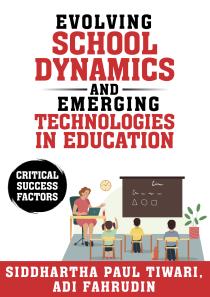EVOLVING SCHOOL DYNAMICS AND EMERGING TECHNOLOGIES IN EDUCATION: CRITICAL SUCCESS FACTORS
Keywords:
Technology Integration in Education, Enhancing The Leadership Capacity of Schools, Changing Paradigms in Education, Learning Through Technology, an Innovative Approach to School ManagementSynopsis
With the rapid advancement of technology, integrating it with changing school dynamics presents a unique opportunity to empower school leaders and change the educational landscape. Using cutting-edge technologies, such as artificial intelligence, virtual reality, and data analytics, as well as changing paradigms of school operations and teaching methodologies, this abstract discusses how school leaders can enhance their capabilities through the utilization of these technologies. A number of points are made in this paper emphasizing the need for leaders to adapt to these changes proactively in order to successfully guide their institutions in the digital age. In the paper, the authors explore various strategies for integrating technology into school management and curriculum, highlighting the benefits of an educational environment powered by technology, such as personalized learning, improved administrative efficiency, and data-driven decision-making. From ensuring equitable access to technology to maintaining student privacy and security, this book addresses the challenges and ethical considerations involved in this transformation. Leaders can create more innovative, inclusive, and effective educational experiences by embracing emerging technologies and understanding the dynamics of schools as they evolve. As a result of this empowerment, the current generation of learners will benefit in addition to providing a solid foundation for the future of education.
References
Adhikari, D. R., & Shrestha, P. (2023). Knowledge management initiatives for achieving sustainable development goal 4.7: higher education institutions’ stakeholder perspectives. Journal of Knowledge Management, 27(4), 1109-1139.
Ally, M., & Samaka, M. (2013). Open education resources and mobile technology to narrow the learning divide. International Review of Research in Open and Distributed Learning, 14(2), 14-27.
Bejinaru, R. (2019). Impact of digitalization on education in the knowledge economy. Management Dynamics in the Knowledge Economy, 7(3), 367-380.
Blanden, J., Doepke, M., & Stuhler, J. (2023). Educational inequality. In Handbook of the Economics of Education (Vol. 6, pp. 405-497). Elsevier.
Bottery, M. (2006). Education and globalization: Redefining the role of the educational professional. Educational review, 58(1), 95-113.
Caratozzolo, P., Sirkis, G., Piloto, C., & Correa, M. (2020, November). Skills Obsolescence and Education Global Risks in the Fourth Industrial Revolution. In 2020 IFEES World Engineering Education Forum-Global Engineering Deans Council (WEEF-GEDC) (pp. 1-5). IEEE.
Carnevale, A. P., & Desrochers, D. M. (2002). The Missing Middle: Aligning Education and the Knowledge Economy. Journal for Vocational Special Needs Education, 25(1), 3-23.
Dale, R. (2005). Globalisation, knowledge economy and comparative education. Comparative education, 41(2), 117-149.
Dumont, H., & Ready, D. D. (2023). On the promise of personalized learning for educational equity. Npj science of learning, 8(1), 26.
George, E. S. (2006). Positioning higher education for the knowledge based economy. Higher education, 52, 589-610.
Haleem, A., Javaid, M., Qadri, M. A., & Suman, R. (2022). Understanding the role of digital technologies in education: A review. Sustainable Operations and Computers, 3, 275-285.
Halili, S. H. (2019). Technological advancements in education 4.0. The Online Journal of Distance Education and e-Learning, 7(1), 63-69.
Hanushek, E. A., & Woessmann, L. (2023). The knowledge capital of nations: Education and the economics of growth. MIT press.
Konstantinidou, E., & Scherer, R. (2022). Teaching with technology: A large-scale, international, and multilevel study of the roles of teacher and school characteristics. Computers & Education, 179, 104424.
Lauder, H., Young, M., Daniels, H., Balarin, M., & Lowe, J. (Eds.). (2012). Educating for the knowledge economy?: critical perspectives. Routledge.
Leidner, D. E., & Jarvenpaa, S. L. (1995). The use of information technology to enhance management school education: A theoretical view. MIS quarterly, 265-291.
Leibold, M., Probst, G. J., & Gibbert, M. (2007). Strategic management in the knowledge economy: new approaches and business applications. John Wiley & Sons.
Mahfood, S., Astuto, A., Olliges, R., & Suits, B. (2005). Cyberethics: social ethics teaching in educational technology programs. Communication Research Trends, 24(4), 3-23.
Marginson, S. (2010). Higher education in the global knowledge economy. Procedia-Social and Behavioral Sciences, 2(5), 6962-6980.
Olssen, M., & Peters, M. A. (2005). Neoliberalism, higher education and the knowledge economy: From the free market to knowledge capitalism. Journal of education policy, 20(3), 313-345.
Pappa, C. I., Georgiou, D., & Pittich, D. (2023). Technology education in primary schools: addressing teachers’ perceptions, perceived barriers, and needs. International Journal of Technology and Design Education, 1-19.
Rahimjanovna, S. M. (2020). Teaching ethics to students in technology education. Asian Journal of Multidimensional Research (AJMR), 9(3), 119-122.
Rau, P. L. P., Gao, Q., & Wu, L. M. (2008). Using mobile communication technology in high school education: Motivation, pressure, and learning performance. Computers & Education, 50(1), 1-22.
Romanelli, M. (2017). Rethinking public organizations as knowledge-oriented and technology-driven organization. Management dynamics in the knowledge economy, 5(4), 559-576.
Trani, E. P., & Holsworth, R. D. (2010). The indispensable university: Higher education, economic development, and the knowledge economy. R&L Education.









